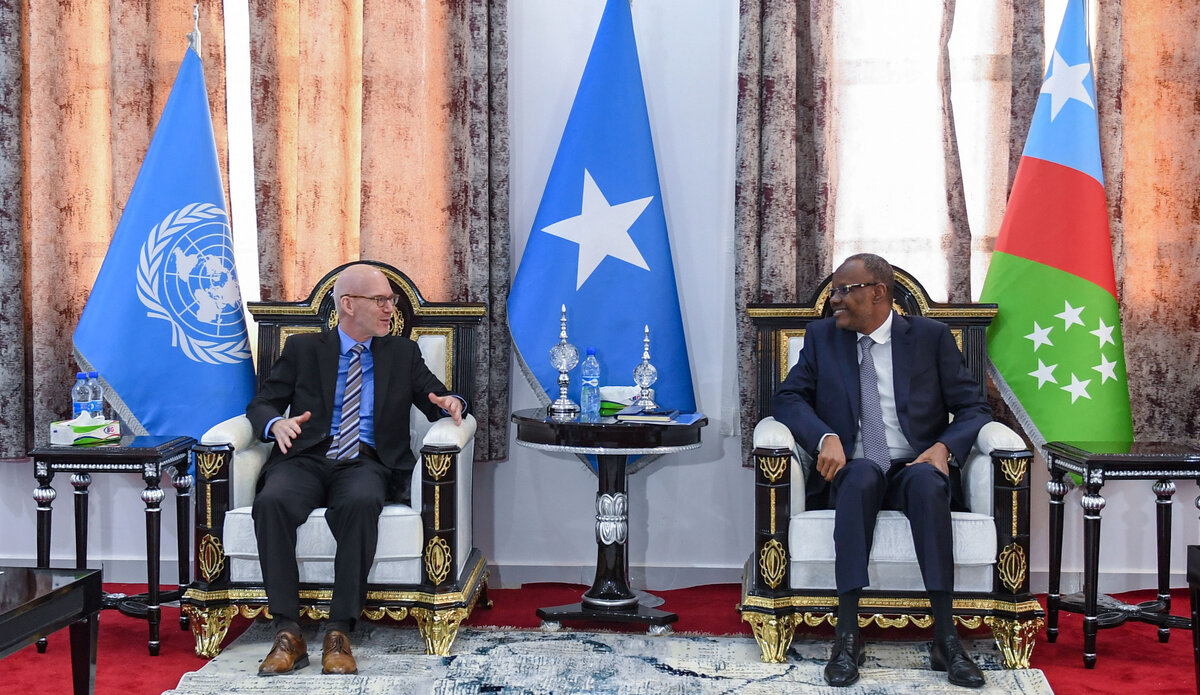UN Special Representative discusses security, drought and state-building on South West State visit
Baidoa – Security, peace- and state-building, as well as the drought, were among issues covered in discussions today by the top United Nations officials in Somalia on his visit to the country’s South West State.
In relation to security in that Federal Member State, the UN Special Representative for Somalia, James Swan, highlighted recent lethal attacks by Al-Shabaab there.
“Please allow me to begin by expressing my condolences on the tragic deaths of South West State’s regional Minister of Justice, Sheikh Hassan Ibrahim, and several other people, including one of his sons, on Friday. Several others were also injured, we wish them a speedy recovery. And this incident of course also followed the death of Merka District Commissioner Abdullahi Ali Wafow for which I also extend condolences,” Mr. Swan said.
According to reports, the minister and others were killed by an explosive device after leaving a mosque last Friday, while the district-level official and several others were killed in a suicide bombing last Wednesday.
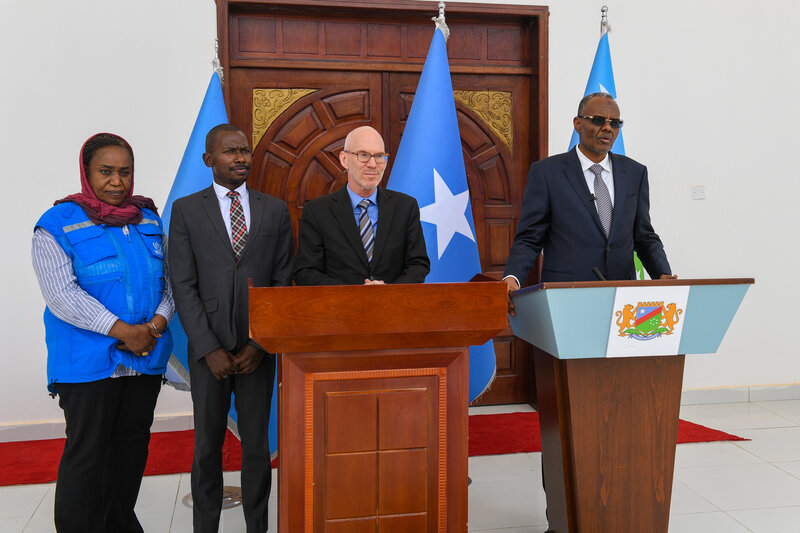
The UN Special Representative’s remarks were delivered at a joint media encounter with South West State’s President Abdiaziz Hassan Mohamed ‘Laftagareen,’ with whom he had met earlier in the Federal Member State’s temporary capital, Baidoa.
He said the latest attacks by the terrorist group were a stark reminder of the danger it poses to civilians and to peace and stability across Somalia.
“I expressed my concern about Al-Shabaab’s continued activities across South West State, and we discussed the group’s recent attacks in Bakol. These incidents underscore the need to advance Somalia’s security transition in order to be better able to confront such threats,” Mr. Swan said.
In addition to security, the UN official said he and the South West State president touched upon a range of other local and national issues of importance, including how best to advance Somalia’s peace-building processes and state-building processes now that a new Federal Government and leadership was in place.
“We agreed on the importance of a deep collaboration between the Federal Government and Federal Member States to advance progress on national priorities,” Mr. Swan said.
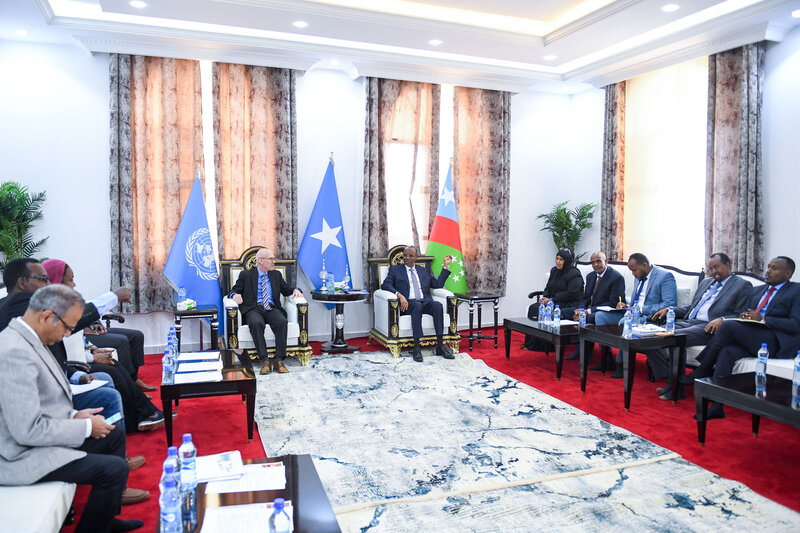
At a more local level, the need for amicable approaches to end differences was emphasized.
“I also welcomed assurances by President Abdiaziz that, he along with South West State’s other prominent political figures, will pursue peaceful dialogue to resolve any differences they may have. It is important that political disputes be resolved through dialogue and that freedom of speech is ensured as laid out in South West State’s Provisional Constitution,” Mr. Swan said.
Drought response
The ongoing drought which is affecting millions of Somalis, including many in South West State, figured prominently in the UN officials’ discussions with the Federal Member State’s leadership.
Mr. Swan said that while the situation was an immense challenge, the South West State’s administration and the humanitarian community were doing their utmost to respond to the humanitarian crisis.
“In this respect, we discussed the importance of access to remote areas, as well as the increasing inflows of internally displaced people in Baidoa and other urban centres in South West State. UN agencies are already responding through programmes of cash transfer, nutrition assistance, water and sanitation support and health services,” he said.
“But the situation is dire and more needs to be done,” he added. “To this end, the United Nations continues to advocate with the donor community for the mobilization of more resources to meet this challenge across the country and here in South West State.”
Somalia is facing a fourth consecutive failed rainy season and a heightened risk of famine with eight areas believed to be at risk of famine by September.
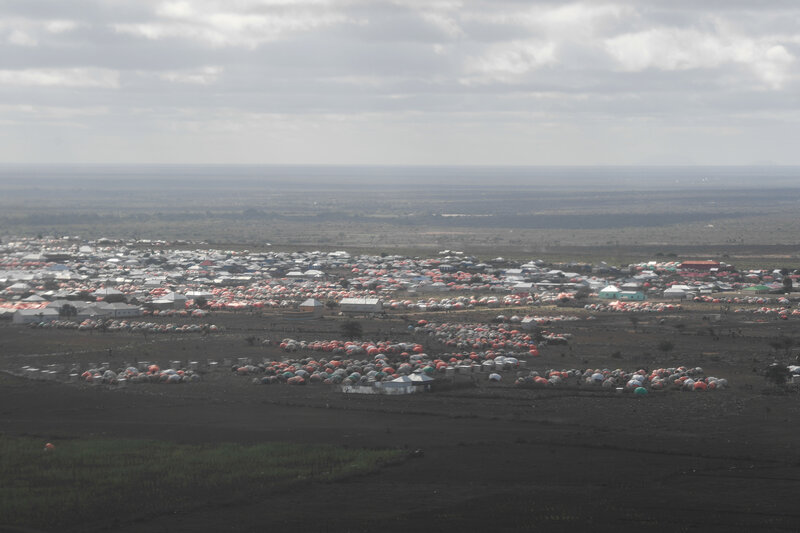
According to the UN Office for the Coordination of Humanitarian Affairs (OCHA), the current drought has affected seven million people and displaced more than 800,000 in search of food, water and pasture. Some 7.1 million people – 45 per cent of the population – are acutely food insecure, while an estimated 1.5 million children under the age of five face acute malnutrition. At least 200 children have died of malnutrition and disease since January.
This year’s Humanitarian Response Plan for Somalia seeks around $1.5 billion to meet the country’s most critical humanitarian needs. So far, only 42.6 per cent of that amount has been received.
On his visit to Baidoa, the UN Special Representative was accompanied by the Chief of Mission of the International Organisation for Migration (IOM) in Somalia, Frantz Celestin, and the deputy head of the Office of the UN High Commissioner for Refugees (UNHCR), Sanaa Omer. The trio met with representatives of various local civil society groups, including the Bay Women Association Network (BWN), the Allamagan Relief and Rehabilitation for Disabled People Organization, the Somali South West Non-State Actors (SOSWENSA) and the South West Youth Vision.
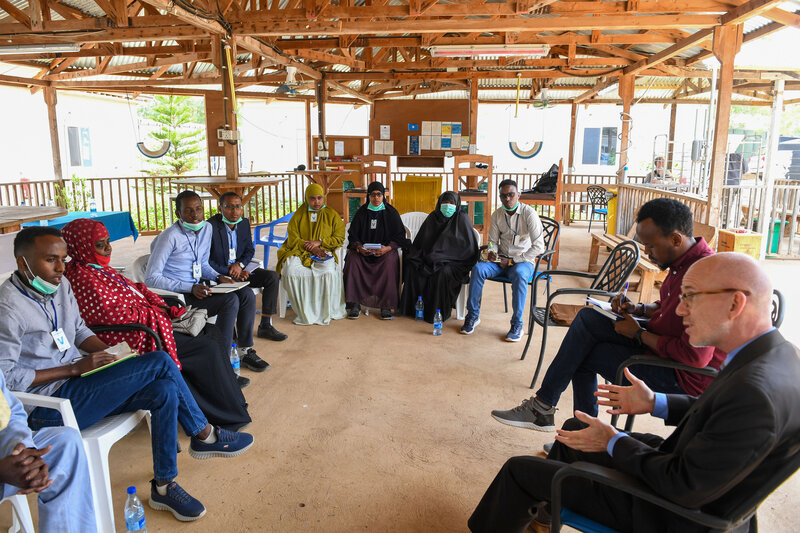
The visit was the UN Special Representative’s third such visit to one of Somalia’s Federal Member States this month, and was part of his regular engagement with Somali leaders. His two previous visits were to Puntland and Galmudug.
 UN
UN
